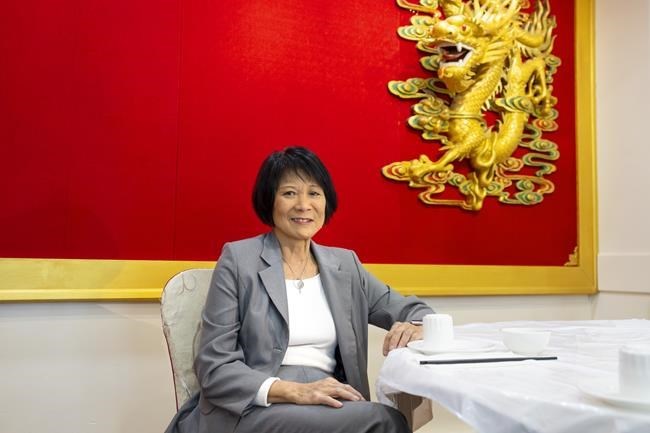TORONTO — The six leading candidates in Toronto's mayoral election outlined their visions for transit, city services and taxes on Wednesday at a debate in Scarborough, the east-end area poised to be a key battleground in next month's election.
The debate, hosted by several community groups on the University of Toronto's Scarborough campus, was the third of the day for the candidates deemed to be in the top tier, according to a series of recent polls.
Onstage was the apparent front-runner, former federal lawmaker and New Democratic Party stalwart Olivia Chow, city councillor Josh Matlow and ex-police chief Mark Saunders.
Rounding out the group was former deputy mayor Ana Bailão, councillor Brad Bradford and former Liberal MPP for Scarborough-Guildwood Mitzie Hunter, who resigned her seat at Queen's Park to run in the byelection.
Candidates pledged to improve declining services and bolster infrastructure like transit, while some promised to invest in community centres in Scarborough, a diverse and populous area where the issues facing all of Toronto are being acutely felt.
"In Scarborough, I will be your champion because for too long there hasn't been the kind of service that Scarborough residents deserve," Chow said in an opening statement, listing "libraries, community centres, child-care centres, skating rinks" and pools as among the sorely needed services.
Chow, the leading candidate according to several polls, came under attack from her rivals -- notably Bradford and Saunders -- who charged that paying for her plans would force tax hikes.
She rejected those claims, but along with fellow progressive Matlow, said candidates need to be honest with Torontonians about the need to raise taxes to restore crumbling city services.
"We need to have at least a moderate tax increase if we want to fix our roads, if we want better access to recreation centres, if we want to send our kids to camp," Matlow said.
"If we want to fix the problems that we have ... we're going to have to pay for it," he added.
All candidates highlighted transit as a crucial issue, with many noting that TTC service cuts have impacted Scarborough the most.
Hunter, who grew up in Scarborough, said she would integrate fares across different transit agencies, while immediately reversing service cuts and a recent fare hike.
Saunders, Toronto's police chief from 2015 to 2020, continued to push his public safety-focused platform, insisting voters were worried about "random disorder" and crime. He accused Matlow, Bailão and Bradford of voting in the past to "defund the police" and remove their guns.
On public safety, Bradford and Bailão advocated pairing police action with improved mental health support response teams, while Matlow, Chow and Hunter prioritized more funding for mental health resources over increasing police strength.
The candidates also faced questions about how they would work with Ontario Premier Doug Ford, given his large influence over municipal affairs.
Saunders and Bailão faced criticism for alleged ties to Ford, while progressives Matlow, Chow and Hunter said years of former mayor John Tory trying to get along with the premier had left Toronto under-funded.
Saunders, widely viewed as Ford's preferred candidate, said the new mayor will need to work with all levels of government if the city is going to survive.
Hunter responded that "we have to work with other levels of government, but we don’t work for other levels of government."
During the debate, mayoral candidate Reginald Tull stormed the stage in protest at not being invited to participate, before being escorted out by security.
In Ontario's 2022 provincial election, Scarborough proved to have an ideologically diverse voter base.
Mayoral candidates have opened campaign offices there, sought endorsements from local provincial lawmakers and unveiled policies aimed at courting voters in the battleground area.
The six candidates face off again on Thursday for a debate hosted by the Toronto Region Board of Trade, as the campaign ramps up before the June 26 byelection.
This report by The Canadian Press was first published May 24, 2023.
Tyler Griffin, The Canadian Press

